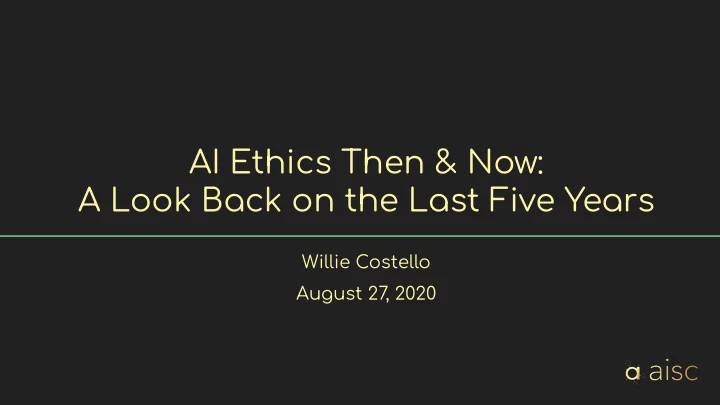

AI Ethics Then & Now: A Look Back on the Last Five Years Willie Costello August 27 , 2020
Five years ago...
Recent* trends* in AI* ethics *some clarifications
About me Willie Costello Data scientist, PhD Philosophy williecostello.com linkedin.com/in/williecostello @williecostello
Three aspects of algorithmic ethics Creators Inputs Outputs
How do we make The ethics of the outputs algorithms fair?
Then: Fairness is just math
Verma & Rubin, “Fairness Definitions Explained” (2018)
Now: Fairness cannot be automated
Case study: Facial recognition technology Buolamwini & Gebru, “Gender Shades” (2018)
Uncovering unfair outputs is work
The fairness of the use itself “Face recognition will work well enough to be dangerous, and poorly enough to be dangerous as well” – Philip E. Agre “Sometimes technology hurts people precisely because it doesn't work & sometimes it hurts people because it does work. Facial recognition is both. When it doesn't work, people get misidentified, locked out, etc. But even when it does , it's invasive & still unsafe.” – Deb Raji Philip E. Agre, “Your Face Is Not a Bar Code” (2001); Raji et al., “Saving Face” (2020)
The disparate deployment of algorithmic systems “The future is already here, it's just not evenly distributed” – William Gibson Virginia Eubanks: Yes, because algorithmic systems are disproportionately deployed on the poor and marginalized Virginia Eubanks, Automating Inequality (2018)
Bias in, The ethics of the inputs bias out
Then: Not the algorithm’s problem
Now: The insistence that algorithms are “objective” is itself a kind of bias
Bias can be encoded in a dataset’s features Gender 1 0 0 1 1 0 1 0
Bias can be encoded in a dataset’s features “ Race itself is a kind of technology – one designed to separate, stratify, and sanctify the many forms of injustice experienced by members of racialized groups” – Ruha Benjamin Ruha Benjamin, Race After Technology (2019) Safiya Umoja Noble, Algorithms of Oppression (2018) Hanna et al., “Towards a Critical Race Methodology in Algorithmic Fairness” (2020)
Data collection is not a neutral process Jo & Gebru, “Lessons from Archives: Strategies for Collecting Sociocultural Data in Machine Learning” (2020) Denton et al., “Bringing the People Back In: Contesting Benchmark Machine Learning Datasets” (2020)
Datasets must be documented "We propose that every dataset be accompanied with a datasheet that documents its motivation, composition, collection process, recommended uses , and so on." – Gebru et al. Gebru et al., “Datasheets for Datasets” (2020) Bender & Friedman, “Data Statements for Natural Language Processing” (2018) Mitchell et al., “Model Cards for Model Reporting” (2019) Raji et al., “Closing the AI Accountability Gap” (2020)
Who makes The ethics of the creators the algorithms?
Then: We need more diversity in tech!
Now: Who owns the algorithms?
Critiquing academia’s role, too "[Machine learning] research agendas reflect the incentives and perspectives of those in the privileged position of developing machine learning models , and the data on which they rely. The uncritical acceptance of default assumptions inevitably leads to discriminatory design in algorithmic systems, reproducing ideas which normalize social hierarchies and legitimize violence against marginalized groups."
What does AI ethics now require? Thinking outside the (black) box Thinking outside of computer science A renewed focus on power
"Don’t ask if artificial intelligence is good or fair, ask how it shifts power" – Ria Kalluri
Thank you! For a complete bibliography, go to williecostello.com/aiethics Follow me on Twitter @williecostello and on LinkedIn at linkedin.com/in/williecostello
Recommend
More recommend